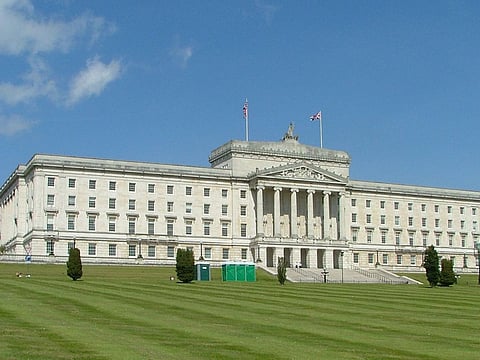Lighting a fuse in Northern Ireland
The British-ruled province is without a working government for 18 months, and there are dark forces at work there

There is always reason to be weary on any Friday the 13th, and the one just past is a case in point. Sometime, in the late hours of that night, or the early hours of the one that followed, someone threw a bomb at the home of Gerry Adams in Belfast.
For many, the former president of Sinn Fein is the face of Irish nationalism, a man who has a long association with Sinn Fein, political violence in the province, and a convicted terrorist who brought Irish republicans to the peace table and converted them to a peace process.
A second bomb was also thrown at the home of another Sinn Fein politician, Bobby Storey, and he like Adams has spent many years sitting in prison cells for his activities with the Provisional Irish Republican Army.
Since peace took hold in the British-governed province two decades ago, Storey received an amnesty, and served as Sinn Fein’s Northern Ireland chairman.
The twin attacks also coincided with six consecutive nights of rioting in Derry. For observers of Northern Ireland, unrest is not unusual at this time of year, with the Orange Order, the hardline Protestant and Loyalist organisation taking to the streets to mark the “glorious twelfth” to commemorate William of Orange’s victory of the Roman Catholic forces for King James II of England at the Battle of the Boyne in 1690. Yes, history has a long reach in Ireland. From July 12 through to August 12, where the Apprentice Boys of Derry celebrate the lifting of the siege of that city back in 1689 by Williamite forces, the province endures its annual “marching season” where tensions run high.
So far, shots have been fired and pipe bombs thrown and police in the restive province say it’s only a matter of time before someone is killed or seriously hurt.
The attacks on the Adams and Storey homes, however, are believed to be the work of so-called Republic dissidents — men opposed to the Good Friday Agreement signed 20 years ago that brought three decades of political and sectarian violence that killed 3,600 and injured more than 36,000 to an end.
These dissidents believe that only violence and armed struggle can re-unite the six counties controlled by Britain since 1921 when the other 26 counties to the south became independent in what is now the Republic of Ireland.
The border has existed since then, and will be the only land border between the United Kingdom and the rest of the European Union when Brexit takes effect on March 29 next and beyond.
All of the parties concerned with the negotiations between Brussels and London, Belfast and Dublin, are intent that this border will remain open for the free movement of goods, services, trade and people once Brexit comes — and that the dark forces at work right now in having those shots fired and pipe bombs thrown have no reason to escalate their actions.
For their part, all of the political parties in Northern Ireland came together and issued a joint statement of condemnation, which is a good thing. But it would be far better if all of these five parties got together and hammered out a political agreement that would see them return to work at the regional assembly in Stormont, just to the south of Belfast, in a power-sharing government that has been provided for by the Good Friday Agreement.
Since February 2017, the politics and politicians of the British-ruled province have been deadlocked over forming a power-sharing executive, and London has abjectly failed in its responsibilities to get the Democratic Unionist Party (DUP) — the largest on the Loyalist or Unionist side — and Sinn Fein — the largest on the nationalist or republican side — back to work or indeed the negotiating table.
Assembly elections in March of 2017 didn’t break the deadlock, nor deadlines, threats and rounds of talks that ended in failure four months ago.
There is a sense too that the situation is not being helped by the fact that the Conservative party of UK Prime Minister Theresa May, as fractured and as fragile as it is, is only clinging to power through a confidence and supply arrangement from the DUP’s 10 Members of Parliament at Westminster.
And when it comes to Brexit, the DUP has no truck with any deal that might threaten UK or Northern Irish sovereignty in any deal over the border with the EU and Dublin.
The DUP and Sinn Fein aside, the three other parties in the Northern Ireland Assembly, the Social Democratic Labour Party, the Ulster Unionists and the cross-community Alliance party, just want to get back to work at Stormont.
For people in the province there, they face the ugly reality of being caught between two competing power vacuums.
In Stormont, Sinn Fein and the DUP can’t agree on a joint mandate for a new power-sharing arrangement, and both sides are hung up over a language rights’ act that would give Gaelic speakers — a dialect spoken fluently by about 1 per cent of the population — the same legal footing as English.
In Westminster, the Brexit-consumed Conservatives can’t agree on anything — with or without DUP support — and just want the summer recess to come as quickly as possible.
As the events of this past week have shown, there are dark forces who are prepared to take matters into their own mischievous hands if these power vacuums continue — and that will be a dark day for all.


